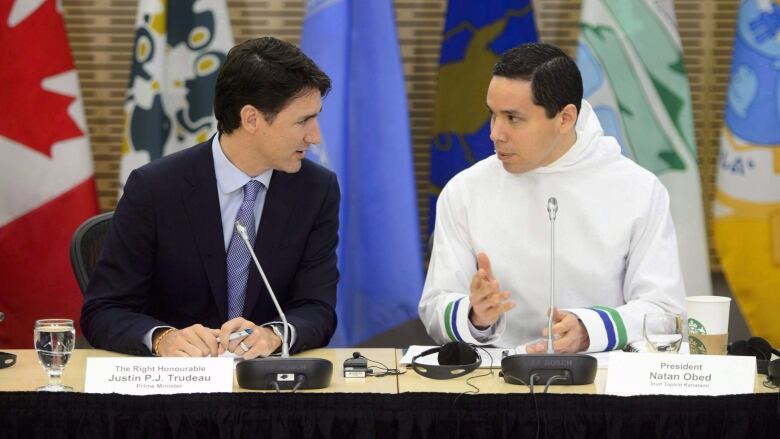Feds, Inuit leaders implement new policy to recognize Inuit homeland as a distinct region
Policy should create expectation of 'foundation of knowledge' across federal departments

Inuit leaders and the federal government have formally endorsed the Inuit Nunangat Policy, which Inuit Tapiriit Kanatamipresident Natan Obed said recognizes the distinct culture, geography and politics of Inuit and their right to self-govern.
"No longer do we as Inuit have to go piecemeal to every single individual within federal departments inareas we want to make a difference," said Obed during a press conference Thursday following a meeting of theInuit-Crown Partnership Committee.
The policy recognizes Inuit Nunangat the Inuit homeland which includes the Inuvialuit Settlement Region, Nunavut, Nunavik, Nunatsiavut and urban places where Inuit live as geographically, culturally and politically distinct. It follows the 2017 signing of the Inuit Nunangat Declaration.
The federal government often issues policies and funding announcements, but this one will lead to meaningful change, underpinning all decisions the federal government makes where Inuit are concerned, said Obed.
The federal government and elected Inuit leadership from the Inuvialuit Regional Corporation, Nunavut Tunngavik Incorporated, Makivik Corporationand the Nunatsiavut Government, endorsed it.
Canada hascommitted $25 million over five years to implement it across every federal department.
Trudeau thanked Inuit leaders for their "dedication to making this policy a reality."
"This announcement is about transforming the systemic inequities that happen within government, where decisions get taken about the North without including the Inuit in those decisions," he said in a press conference.
A policy that allows Inuit to approach the federal government together on issues of mutual interest is necessary, said Obed Inuit are not part of the Indian Act but have a right to self-determination and self-governance.
"There will now be a foundation of knowledge that we will expect from federal departments and from those who have to work on Inuit issues or who have Inuit considerations in their portfolios."
During the meeting Thursday, the committee discussed how the 2022 federal budget, including $845 million for housing across Inuit Nunangat over seven years, which is triple the federal commitment from 2018, will support Inuit.
A day before the meeting, Inuit Tapiriit Kanatami's board met and instructed ITK to seek intervenor status in Canada's appeal of a Quebec court's opinion on the Liberal government's child welfare law, Bill C-92: An Act respecting First Nations, Inuit and Mtis children, youth and families.
A Quebec appeal court ruled in February that two clauses which recognize that Indigenous laws have as much force as federal law and override provincial laws are unconstitutional. Canada is appealing that ruling in the Supreme Court.
TheInuit-Crown partnership committee will continue to meet about Inuit interests, including land claims, Inuktutlanguage revitalization, missing and murdered Indigenous women and girls, education and early learning, health and the environment.
The policy applies to infrastructure, the economy and Arctic defence.
Since the 1970s, Obed said, Inuit have mobilised on their rights and "imagined our homeland in a different geopolitical way" leading up to present-day questions of Arctic sovereignty.
After speaking at length about Canada's decision to supply arms to Ukraine to defend against Russian aggression, Trudeau spoke about the historical role of Inuit when it comes to Canada and its sovereignty over the Arctic.
He said "sovereignty in the North passes through the people who live there and have lived there for millennia."













_(720p).jpg)


 OFFICIAL HD MUSIC VIDEO.jpg)
.jpg)



























































































